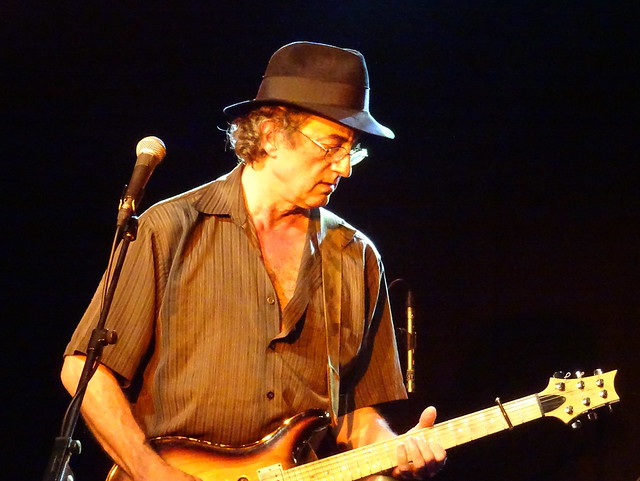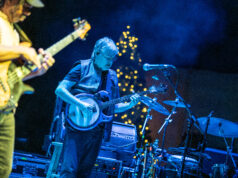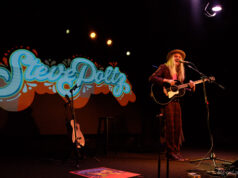
James McMurtry performs at The Garage in London on Feb. 8, 2017. (Photo by Goggins World)
When you go to a lot of concerts, you pick up on details. At James McMurtry’s recent concert, one detail I picked up on was the quality of the sound mixing. James’s sound was pristine. I’ve never heard clearer vocals at The Birchmere as I did on Monday. At times, James himself adjusted his amp to get it just right.
I start my review with this detail to emphasize that James is, above all else, a polished, professional performer. He attends to details, and he takes what he does seriously. As he put it before his third song of the evening, “Whassa Matta,” he tried to explain to his ex-wife that “we aren’t on vacation out here.” He also said that he welcomed his ex-wife the “girl version of the song,” a la Kitty Wells, who sold more copies of “Honky Tonk Angels” than the Ray Price original.
James is an openly political musician. He had something of a breakthrough with “We Can’t Make It Here Anymore,” which became an anthem for the Occupy Movement. James did not hesitate to mock the current administration. “Copper Canteen,” on a “relatively recent album” (2015’s Complicated Game) got James a mention “in the failing New York Times,” making him “a participant in the fake news industry.”
“State of the Union,” a single released this year, came about because of a rhyme: “My brother’s a fascist, lives in Palacios.” (Palacios is pronounced Pa-la-shus.) While James gets classified as a country performer — I prefer the term “Americana” — the opening line doesn’t fit with stereotypes of country music. The song goes on, after a line, “He don’t like the Muslims, he don’t like the Jews / He don’t like the Blacks, and he don’t trust the news.”
Introducing “Choctaw Bingo,” James told the audience that his great-grandfather was a Methodist Minister, which was why his father became an atheist. James shares his father’s atheism, and he said he’d never known any music to violate that view. He dedicated the song to “the first Crystal Methodist Church” of Oklahoma. As I said, James doesn’t fit the standard mold of the country singer.
As James related, one of his friends told him, “A good old boy can become an intellectual, but an intellectual can’t become a good old boy.” James said his friend is right; he’s tried. James mentioned that he is “the son of two academics.”
While James’s mother is a former English professor specializing in Shakespeare, his father is hardly best known as an “academic.” Larry McMurtry is a Pulitzer Prize and Oscar Prize-winning writer, author of the novels Lonesome Dove, Terms of Endearment, and The Last Picture Show, and one of the Oscar-winning screenwriters who adapted Brokeback Mountain.
“Painting by Numbers” on James’s first album (Too Long in the Wasteland, 1989) “was supposed to be his big radio hit.” Sarcastically, he said, it was “the first of many supposed to be big radio hits.” James has never broken through as a mainstream figure, but he has a cult following, and he is well-respected in the musical community.
One measure of this respect is that other highly-regarded artists have covered James’s songs. James introduced “Levelland,” (from his 1995 album, Where’d You Hide The Body) as “one of the Robert Earl Keen songs that I wrote.”
The full house at The Birchmere was largely respectful, wanting to listen to the subtlety of James’s lyrics and masterful guitar playing. When an audience member, who was likely inebriated, called out a song he wanted to hear, James responded, with a wave of his hands, “Now don’t start that. Y’all know what you wanna hear, but none of you know what you’re gonna get.” At the end of the night, James received a standing ovation, and returned to the stage for an encore, playing “Lights of Cheyenne.”
James McMurtry is currently touring on selected dates. Tonight, March 30, he’ll be in Charleston, South Carolina, with John Moreland. James has a standing engagement on Wednesday evenings at the famed Continental Club in Austin, Texas. If you enjoy complex, lyrically dense songwriting and masterful guitar playing, James puts on one hell of a show. If you’ve been scared to try country music for one reason or another, James’s music is a good, country (adjacent) entry point from a progressive, intelligent artist. Don’t be shy — give it a try!






